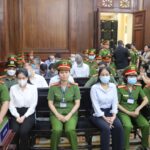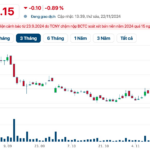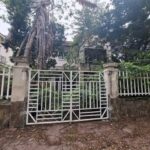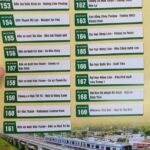In Ho Chi Minh City, many farmers have boldly shifted from traditional production methods to a more focused approach, developing various models that incorporate technological advancements, scientific progress, and sustainable practices. This aligns with the city’s orientation towards urban agriculture.
A notable example of this transformation is Mr. Nguyen Nhu Hao, a farmer from Phu Huu Ward, Thu Duc City, Ho Chi Minh City. With his extensive experience in agricultural production and a keen understanding of market dynamics, influenced by the local Farmers’ Association, Mr. Hao decided to transition from raising wild boars to cultivating mushrooms using high-tech methods in a 2,000-square-meter net house on his family’s land.
This change occurred in 2017, and the primary goal was to reduce environmental impact and ensure food safety. However, producing high-quality mushrooms requires technical expertise, technological investment, and a profound understanding of cultivation processes. Consequently, Mr. Hao encountered numerous challenges during the initial phase.
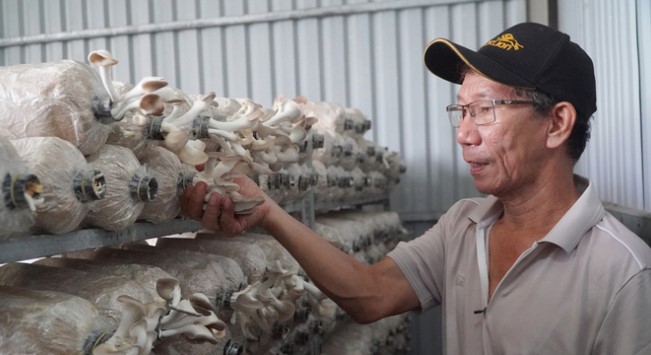
Mushrooms are grown in a net house to prevent insects and diseases. Photo: Nguyen Thuy/Nong Nghiep Viet Nam.
Despite his son’s academic background in mycology from a prestigious institute, the gap between theoretical knowledge and practical application posed significant challenges. Additionally, finding buyers for the mushrooms proved to be a major obstacle due to a lack of established connections.
“Previously, I had regular customers for my wild boars, and restaurants favored the meat,” Mr. Hao shared. “However, switching to mushroom cultivation presented numerous difficulties, including technical aspects and product marketing. I incurred substantial losses initially and had to borrow money to keep the business afloat. It was only through perseverance and continuous improvement that I achieved stability. It took me five years to establish relationships with regular buyers,” he added.
Despite his age, Mr. Hao’s dexterous hands and sharp mind allowed him to craft most of the machinery and equipment used in his mushroom farm. He only purchases modern tools and then modifies them to suit his unique cultivation process.
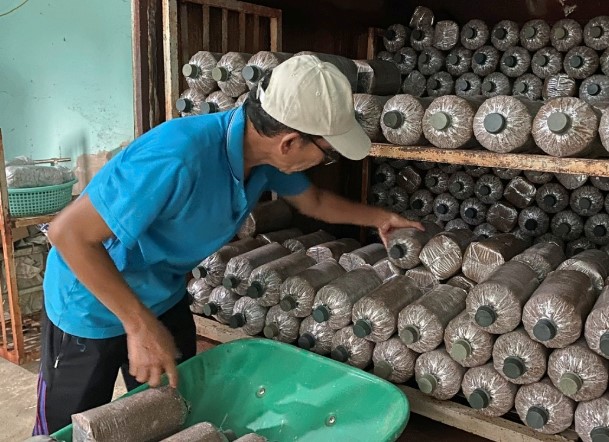
The process of boiling nutrient bags to eliminate pathogenic bacteria. Photo: Ho Chi Minh City Tourism Magazine.
By leveraging technology in production, Mr. Hao has created an ideal environment for mushroom cultivation, unaffected by harsh external weather conditions. The automated system minimizes labor requirements while increasing productivity and mushroom quality.
After five years of perseverance through setbacks, Mr. Hao’s mushroom cultivation model has achieved initial success. His lion’s mane mushrooms are of exceptional quality and well-received by the market. The output is consistently purchased by intermediaries who then sell them at local markets, e-commerce platforms, and social media channels, with prices set at wholesale rates.
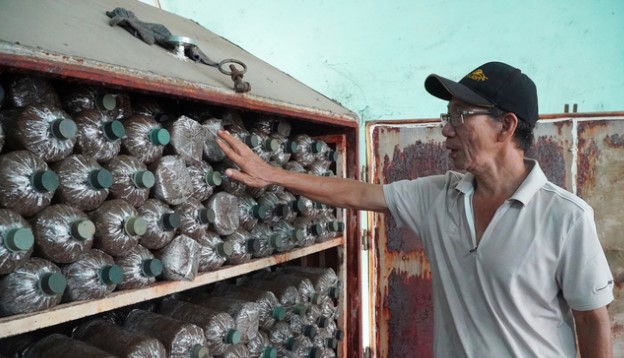
According to Mr. Hao, his farm currently houses over 50,000 lion’s mane and lingzhi mushroom spawn, yielding an average monthly production of approximately one ton. All the harvested mushrooms are sold daily, with a unit price of VND 60,000 per kilogram. After deducting expenses and considering asset depreciation, the estimated annual profit nears VND 400 million.
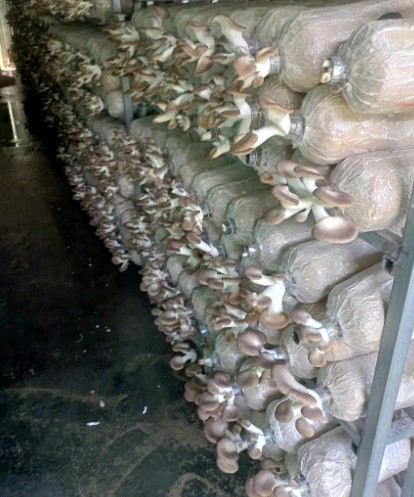
Mr. Hao’s mushrooms are of high quality and well-received by the market. Photo: Ho Chi Minh City Tourism Magazine.
Mr. Hao asserts that the production process at his farm is entirely organic, devoid of any chemicals or pesticides. The mushrooms are grown in a net house to prevent insects and diseases, and the spawn is sterilized by steaming at 100 degrees Celsius for 12 hours, ensuring a relatively safe product.
“In this era of innovation, farmers like me receive government support to access new scientific advancements,” he said. “Additionally, the government recognizes and encourages our efforts. Recently, the Ho Chi Minh City Farmers’ Association sponsored a study tour to Taiwan, allowing me and other exemplary farmers to learn from their advanced agricultural technologies, especially in urban farming, for over a week.”
Mr. Hao continued, “It’s true that ‘a day’s journey teaches you a basketful of wisdom.’ By observing and learning from their best practices, I could reflect on my challenges and make necessary adjustments to stay relevant in this modern age. If we diligently gather experience and make strategic investments, we can create products that can compete with those from more advanced countries.”
Looking ahead, Mr. Hao plans to expand his farm’s area and implement additional technological improvements to increase productivity and stability.
Not only has he achieved personal success, but he has also generously shared his knowledge and experience with fellow farmers interested in mushroom cultivation. Furthermore, he allocates a portion of his profits to support less fortunate individuals within the local Farmers’ Association.
Mr. Hao’s story is a testament to his bold thinking, adaptability, and ability to keep up with market trends. Transitioning from a traditional wild boar breeder, he seized the opportunity and found success in high-tech mushroom cultivation.
His journey illustrates how innovation in agriculture not only boosts farmers’ incomes but also opens doors to sustainable development. In today’s world, embracing advanced technologies and market insights is the key to helping farmers not just survive but thrive and prosper.
The Pearl of the East: Unveiling the Hidden Gem of Nhơn Trạch Urban Area
To realize the planning project for the new Nhon Trach urban area, 74 large-scale projects comprising nearly 5,000 hectares of land have been allocated to investors. However, over the past two decades, this area has become a graveyard for real estate investors and earned unsavory nicknames such as “ghost town” and “the big scam of the decade.”
The Ultimate Guide to Seamless Travel: 17 Bus Routes Connecting Metro Line 1, Ben Thanh – Suoi Tien
The Ho Chi Minh City Department of Transport has released an extensive list of bus routes that will connect with the highly anticipated Metro Line 1, running from Ben Thanh to Suoi Tien. This seamless transport network will see 61 bus routes directly linking 14 metro stations across the city’s bustling districts and densely populated areas.

